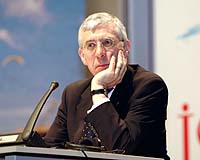| . |  |
. |
Baghdad (AFP) Feb 2, 2011 Iraq's parliament speaker on Wednesday warned that a court ruling placing bodies such as the central bank under ministerial control was a danger to democracy, and threatened to revamp the judiciary. Osama al-Nujaifi's remarks came as a local media outlet published a 2006 letter showing Iraq's top judge seeming to contradict last month's decision to tie several independent bodies to the cabinet, a ruling which has sparked criticism that Prime Minister Nuri al-Maliki is trying to consolidate power. "We think that there is now a real threat to the constitution and democracy as a result of the court's decision," said Nujaifi at a news conference at the Council of Representatives in Baghdad's heavily-fortified Green Zone. "The parliament will present in the coming days a draft law to reform the composition of the supreme court and the Higher Judicial Council," he added. The latter body oversees Iraq's courts. Nujaifi did not elaborate, however, on whether that meant sacking judges or reforming how they were selected in future. Among the other agencies affected by the January 18 supreme court decision are the anti-corruption watchdog, the media regulator and the human rights commission. The ruling followed a request for clarity on the relevant constitutional clause by Maliki's office. It spurred critics of Maliki to accuse him of consolidating power while the bodies themselves have voiced concern, saying they have lost their independence. The court argued they should be answerable to the cabinet instead of parliament because their work was executive in nature. "It is unreasonable that the Integrity Commission (the anti-corruption agency), which monitors the work of the government and the state, is linked to any other body," Nujaifi said. "That would kill its work." "The communications and media commission, the central bank, the human rights commission -- its unreasonable to link all these bodies to the executive authority. And also the election commission, how can it be linked to the government?" Nujaifi is an MP with the Sunni-backed Iraqiya bloc, which won the most seats in Iraq's March 7 election but was unable to form a government because Maliki, whose political group came a narrow second in the polls, joined forces with a pan-Shiite coalition to trump Iraqiya's total. His remarks came on the same day the independent Sumeria news agency published a letter written by Medhat al-Mahmud, the top judge on Iraq's supreme court and head of the Higher Judicial Council, to the Integrity Commission on September 23, 2006. "The commission submits to the parliament in carrying out its missions, and the parliament is the only body that has the right to question it," Mahmud wrote in the letter, appearing to contradict the January verdict. "The Integrity Commission manages itself in accordance with its independence, like the central bank," he added at the time. Judicial spokesman Abdelsattar Birakdar, who confirmed the letter was legitimate, insisted the January ruling was complementary to the 2006 letter, and that the two documents were not incompatible. "The first letter emphasised that the committees are subjected to monitoring by the parliament," he told AFP. "The recent one also said this, but also explained which body the independent agencies are linked to." "There is no contradiction," he added, without elaborating further on the impact of linking the agencies to Iraq's cabinet. Maliki has defended the court ruling and said reversing it was "impossible". Among the most prominent critics of the move was central bank governor Sinan al-Shebibi, who warned on January 25 that the ruling threatened Baghdad's assets overseas. With the central bank tied to the cabinet and its independence in doubt, according to Shebibi, its accounts would be seen as an extension of the Iraqi government, and exposed to claims by Iraq's creditors.
Share This Article With Planet Earth
Related Links Iraq: The first technology war of the 21st century
 Former British FM Straw to bring Iraq hearings to a close
Former British FM Straw to bring Iraq hearings to a closeLondon (AFP) Feb 2, 2011 Former foreign minister Jack Straw was Wednesday to give evidence to Britain's Iraq war inquiry for the third time as the panel prepared to hold its final public hearing. Straw, who was foreign minister when Britain decided to join the US-led invasion of Iraq in 2003, was expected to be quizzed over the legal basis for the intervention. At previous hearings, Straw said that his decision ... read more |
|
| The content herein, unless otherwise known to be public domain, are Copyright 1995-2010 - SpaceDaily. AFP and UPI Wire Stories are copyright Agence France-Presse and United Press International. ESA Portal Reports are copyright European Space Agency. All NASA sourced material is public domain. Additional copyrights may apply in whole or part to other bona fide parties. Advertising does not imply endorsement,agreement or approval of any opinions, statements or information provided by SpaceDaily on any Web page published or hosted by SpaceDaily. Privacy Statement |